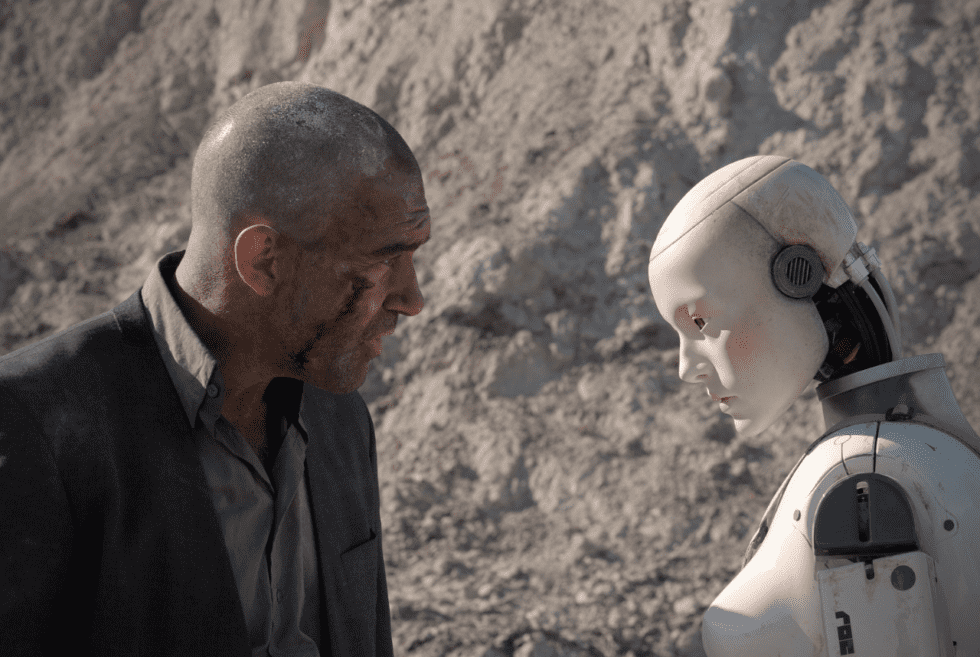There’s an innate horror in seeing what the world might look like after it’s put through the wringer. There’s an infinite list of unimaginable tragedies that could assault civilization as we know it — nuclear crises, cold wars, and perhaps even general moral decline, are just a few.
Watching post-apocalyptic films, however, is also somewhat addicting. Glimpsing at imagined ruins might not seem healthy at first, but it might actually be a healthy practice as it allows us to see what could be, then feel emboldened to avoid a descent toward such bleak trajectories. The world is already brimming with issues as it is, why up the ante and portray it as a crumbling, demolished wasteland?
Black Mirror, a series on Netflix, on the one hand, isn’t exclusively post-apocalyptic in the sense of genre, but its explorations of futures that either overlap with ours or just inches beyond the threshold of our addiction with technology is a masterful. Fiction has many jobs, one of which is to allow us to peek into the aftermath of our present actions.
In that sense, post-apocalyptic movies aren’t mere catastrophic portraits, the main value of which depends largely on shock and agitation. These films are in and of themselves a reflection of our panic and anxiety. Below is a list of the best post-apocalyptic movies content available on Netflix as of this writing. They’re gritty, overtly cynical, and at times even overwrought with the burdens of ideology. Eye-opening is not a phrase that should be used lightly, especially in the company of art, but as far as this list is concerned, there might be a few here deserving to be called as such.
Of course, don’t forget that art is never a messiah; its job isn’t to incite or inspire change. Art is merely the expression of thought put to images, movement, sounds, and other forms of stimulation. Whether or not your point of view on something changes after consuming art largely depends on you. But make sure to give these films a try. If anything, they’ll make your Friday nights more interesting and give you something to mull over throughout the weekend.
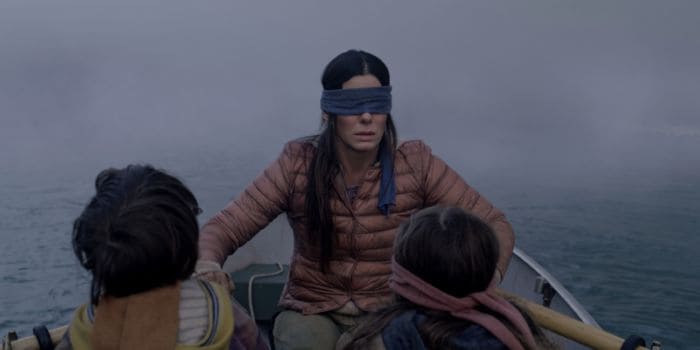
Bird Box
Bird Box is your classic post-apocalyptic fare: there’s a terrible, terrible tragedy, people are dying, an unseen evil is ravaging the citadels of civilization, and it’s up to a ragtag crew of people to survive the bleakness of this new world.
Even still, the way Bird Box tells its story, or more specifically, drops its characters in an almost impossible world, is as exhilarating as it is totally terrifying. When an invisible malevolent supernatural entities start causing unimaginable horror to anyone who looks at them (when they see it, people kill themselves out of sheer terror), Malorie charts a tumultuous journey with her two children down a treacherous river to the only place where hope might wait. But to survive that trip, they must undertake the journey completely blindfolded.
Academy Award-winning actress Sandra Bullock shines here as a mother who has to protect her children at all cost and, at one point, make the toughest decision she’ll ever have to in her life. Trevante Rhodes and Sarah Paulson also take turns in making the story more taut and compelling as Malorie’s husband and sister, respectively.
In all Bird Box might rely on too much tropes to get its story across, but it’s saved by very strong performances from the diverse cast and a decent, if a bit predictable ending.
Director: Susanne Bier – Screenplay: Eric Heisserer – Cast: Sandra Bullock, Trevante Rhodes, John Malkovich – Run Time: 2h 04m
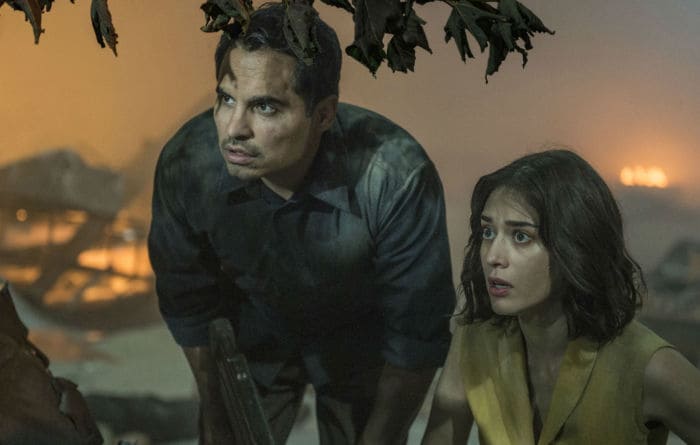
Extinction
When a working class father of the future gets recurring dreams of destruction by a mysterious force, it slowly eats at him, and his relationship with his family, as the dream gets more frequent. Shortly thereafter, he realizes that they may be these nightmares may be offering a morsel of truth. As a relentless alien attack begins to destroy the planet, he must do everything to protect his family. All the while uncovering who he might truly be.
Extinction has the makings of a blockbuster in its DNA. Too bad it wasn’t received that well by critics. Still, there’s something worth watching here, and not just its fun and wacky stylistic choices that recall B-Movies. It’s also one of the first few films Netflix produced, and you can see the streaming service is getting better at choosing which projects to fund. Extinction is, at best, a great concept that comes to be mangled at some point during the arduous, exhausting execution.
So why include it here then? Well, we can’t deny how promising its premise is, and we tend to merit a film not just by looking at it as a whole but by also dissecting its parts and judging those individually and seeing if there’s something worthy of discussion. Extinction has those aplenty. It’s just unfortunate it doesn’t tie all those together neatly.
Director: Ben Young – Screenplay: Spenser Cohen, Brad Kane, Spenser Cohen – Cast: Michael Peña, Lizzy Caplan, Amelia Crouch – Run Time: 1h 35m
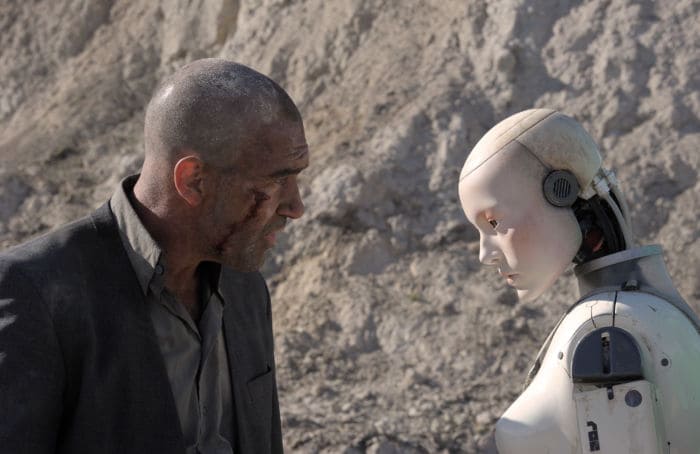
Automata
Drop everything right now and load up Automata — it’ll be one of the most visually striking films you see this year. In this story, we’re still on Earth, but it’s the future, and the ecosystem is on the verge of collapsing.
Man-made robots are roaming the city to protect what humans remain. But when a robot overrides the program commanding him to protect humans, ROC Robotics insurance agent Jacq Vaucan is assigned to investigate what caused the robot to shift gears and promptly eliminate it. But he discovers something far more pernicious that threatens the future of humanity.
The themes explored here aren’t new at all. The original Blade Runner grapples with similar territory, asking important questions about the overlap between sentience, morality, and humanity. What makes Automata different is its stunning cinematography, astonishing visual splendor, and gob-smacking eyecandy. It is simply one of the most beautiful films we’ve seen: every frame sizzles, every scene decorated lavishly.
It’s heavy, too, on the ideas. We’re a bit conflicted on how it treats these ideas, though, and we’re not entirely convinced on the execution. Still, by looks alone, this is worth the couple of hours.
Director: Gabe Ibáñez – Screenplay: Gabe Ibáñez, Igor Legarreta, Javier Sánchez Donate – Cast: Antonio Banderas, Birgitte Hjort Sørensen, Dylan McDermott – Run Time: 1h 49m
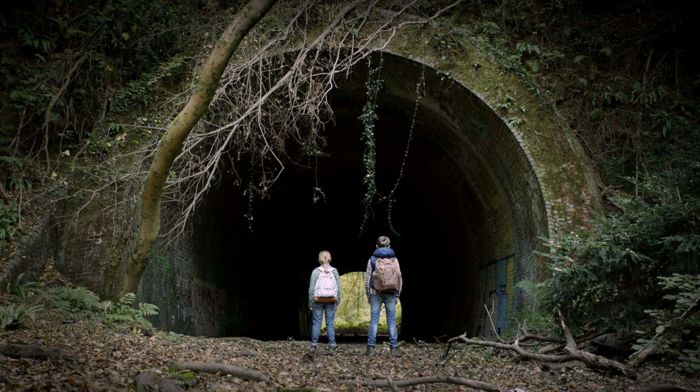
The Last Boy
In The Last Boy, a dying mother sends her young son on a journey to a place where wishes are granted. This no ordinary sci-fi fodder, though — inspired by 13th Century Sufi Mystic and Poet Rumi, the film evinces an ethereal quality that in many respects act as a counterpoint to the conventions of typical sci-fi fare. Here, nothing is rushed or glossed over: no concept is rendered over-simplistically, nor are characters painted in broad, caricaturish strokes to act as anchors for the plot.
That’s because The Last Boy isn’t a big-budget film, and that financial restraint sometimes shows. But only in the sense that there’s no bombastic spectacles every three seconds, nor are there any too overtly lavish sets. With those distractions off the frame we are treated instead to a complex, layered story that starts very, very strong. The film uses the remaining time to fill in the gaps as we go along. This is a risky plot device: when done right, it can hook you immediately and keep you on the edge of your seat. When misfired, it can make a film an utterly dull experience. Thankfully, The Last Boy does it right. Well, mostly. It’s not a perfect film by any stretch of the imagination, but it shoots and it scores more than it misses.
Director: Perry Bhandal – Screenplay: Perry Bhandal – Cast: Luke Goss, Flynn Allen, Peter Guinness – Run Time: 1h 27m
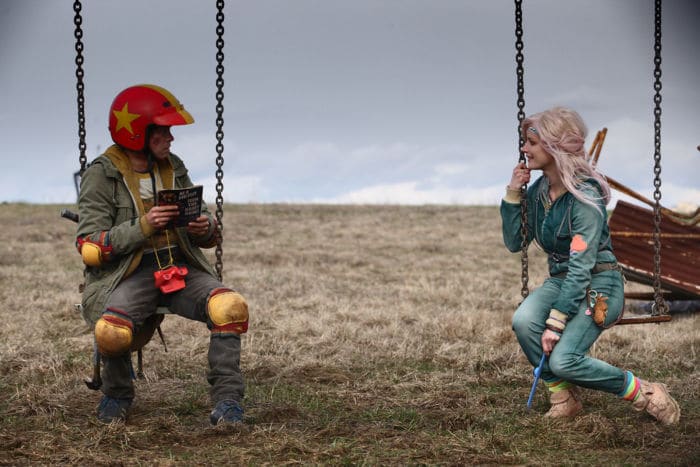
Turbo Kid
Turbo Kid is a rare gem, and best experienced having no knowledge of its story whatsoever. But if you insist, here’s the bare necessity we’re willing to share: The year is 1997. Yet it’s not the 1997 we know — it’s a post-apocalyptic 1997, in all its retro-futurism and nostalgia. Though the milieu nears the aughts, the film calls back to the action-adventure movies popular during the ‘80s. We follow an orphaned teenager who sets off on a journey to save his female-robot companion from the hands of an evil warlord, who in turn controls the only water supply.
That’s all we’re willing to share. But trust us when we say you’re going to like this very much, especially if you’re fond of the ‘80s aesthetic. Turbo Kid is goofy, fast-paced, and at times bordering on juvenile, but that, in our opinion, is where the secret to its charm lies. It’s really got nothing to say about childhood that hasn’t already been said before. The production value is questionable. It’s like Mad Max: Fury Road but the producers pulled the budget mere moments before filming. If you like high-spectacle visuals, you won’t have much of a good time with this. But for something homespun, this kills it. Love it or hate it, you can’t deny the sheet passion embedded in every frame of this little gem.
Director: François Simard, Anouk Whissell, Yoann-Karl Whissell – Screenplay: Anouk Whissell, François Simard, Yoann-Karl Whissell – Cast: Munro Chambers, Laurence Leboeuf, Michael Ironside – Run Time: 1h 33m
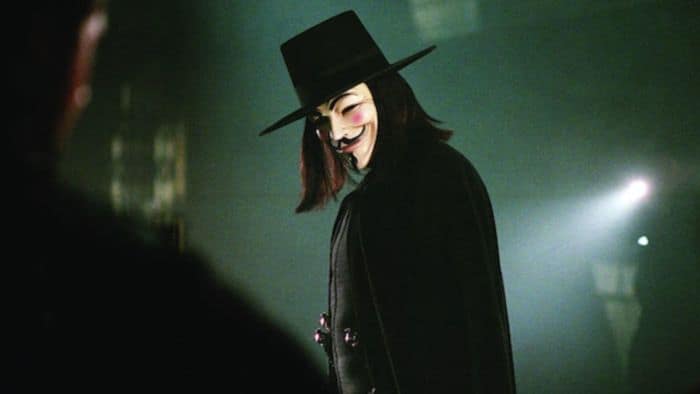
V For Vendetta
Chances are you’ve stumbled upon V For Vendetta once or twice before, as it’s one of the more popular entries in this list. It’s famous for having striking visuals and a thought-provoking story, on top of, let’s not forget, truly iconic set pieces, which will remain burned in pop culture memory forever.
Based on the graphic novel by iconic Alan Moore, V For Vendetta is set in an alternate version of Britain where a corrupt government has risen to complete epower. When a young woman runs into a secret police force, she is rescued by a vigilante named V, in cape and mask, who’s particularly skilled in combat. V, we’ll soon learn, is the embodiment of total rebellion, which obviously is a rarity in the state of government Britain is in. This young woman becomes V’s unlikely ally, made aware of the transgressions of her society and how she contributes to perpetuate its totalitarian grip.
If you don’t like mixing politics with art, skip this. But here’s a dirty secret: every art is a piece of politics, whether you like it or not. This one’s just not apologizing for it. The Wachowskis (The Matrix, Sense8) paint a stirring picture of resistance in a world where it’s the most dangerous commodity. The result is an exhilarating portrait of a world very much near ours, given recent events.
Director: James McTeigue – Screenplay: Lilly Wachowski, Lana Wachowski – Cast: Hugo Weaving, Natalie Portman, Rupert Graves – Run Time: 2h 12m

Mortal Engines
What if entire cities were alive? That’s the premise of Mortal Engines, about a post-apocalyptic world in which entire cities now live on top of gigantic mechanical robots. The steampunk-inspired source material comes care of Philip Reeve, who wrote the first book in 2001. Set in London, the film looks at a mobilized version of civilization destroyed by a cataclysmic event, and follows people who take up the impossible task of trying to stop London (now a giant predator city on wheels) from devouring everything it comes across.
As you can see, Mortal Engines is a not-too-subtle dig on the perils of ownership and man’s unending hunger for triumph, whomever he may stomp on while doing so be damned. Mortal Engines serves up a convoluted plot, and its characters are lack the bite that made the original so brutal yet equal parts endearing. Still, we actually find this adaptation to be vastly underrated. For one, it’s an absolutely masterful new addition to the thin pantheon of post-apocalyptic content involving giant robots. Yes, that’s a thing. But ultimately, it’s a pretty powerful statement on the woes of being an outcast.
It’s Mad Max on steroids. But those steroids were injected in the wrong place. So you get a beastly, formidable monster that’s still enjoyable but is highly deformed and alien. Still worth a watch, though.
Director: Christian Rivers – Screenplay: Fran Walsh, Philippa Boyens, Peter Jackson – Cast: Hera Hilmar, Robert Sheehan, Hugo Weaving – Run Time: 2h 08m
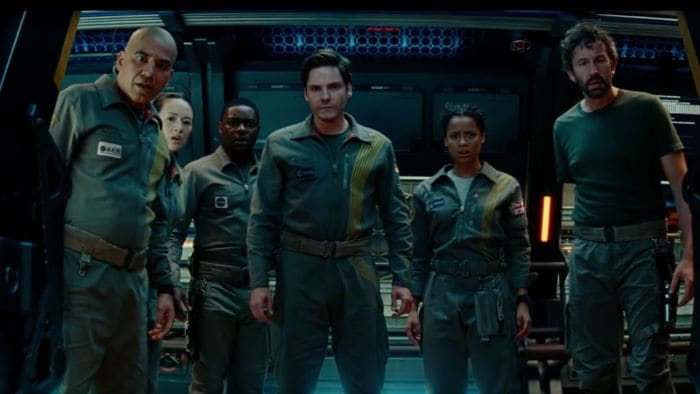
The Cloverfield Paradox
On its own, The Cloverfield Paradox is an ambitious, blistering sci-fi fare with a compelling story and an amazing cast. As the new entry in the Cloverfield series of films, however, it’s less endearing.
The story focuses on a group of scientific researchers on a space station aiming to harness a new energy source called God Particle. But they accomplish something far more sinister. It’s best if you experience the story on your own because, despite its flaws, The Cloverfield Paradox is still one of the better attempts at a realized post-apocalyptic world.
The biggest problem with this film is exposition. In screenwriting lingo, exposition means telling the audience very technical information that’s important towards understanding the plot better. This film isn’t full of it — it’s drowning in it. This is an experience that won’t sit well with most people. But if you like smart scientists throwing out jargon, you’ll like The Cloverfield Paradox. In all, though, this is but a tiny blemish. There’s something human about this film at the end of the day. It’s just sad that it seems to have been assembled rather haphazardly.
What we’re saying is: it’s not Arrival. That film was based on a short story that delved into highly complex concepts deemed untranslatable onscreen, but it managed to make it work without feeling like an entire course on The Path of Least Resistance. But you should watch it — it’s good.
Director: Julius Onah – Screenplay: Oren Uziel, Doug Jung – Cast: Gugu Mbatha-Raw, David Oyelowo, Daniel Brühl – Run Time: 1h 42m
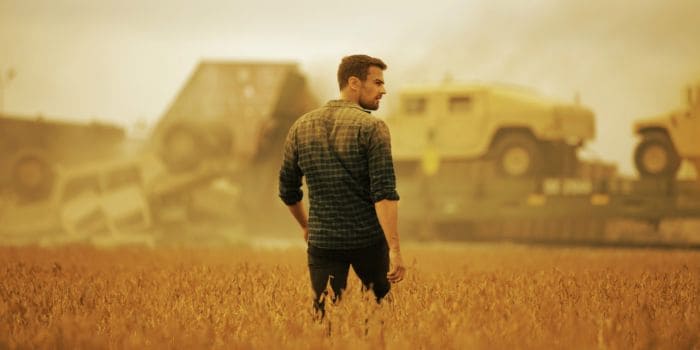
How It Ends
Tells the story of a mysterious apocalypse that causes the spread of misinformation and violence. We follow a man and his estranged father-in-law as they race across the country to save the life of his pregnant wife.
How It Ends is worth a watch, to be sure. But it has a lot of problems. Bear in mind that we included it here because it’s still got some pretty hefty ideas worth exploring. Overall, though, watching it feels like a chore. If you like a challenge, you’ll come to appreciate that heft. At best, it’s an effective thriller that’s gets juicer and more compelling the more it’s allowed to let on. But here’s the trouble with stories about cataclysm: you have to deliver a great ending. An ending so absurd so to be perfect and the only ending that could have warranted such a lofty premise.
Does How It Ends deliver in this regard? Well, there’s no single answer to that. It gallops gleefully and reaches some heights, but there are also times when it stumbles, and in some instances miserably so. But again, it has its moments, and those moments, in our opinion, make this film worth watching.
Director: David M. Rosenthal – Screenplay: Brooks McLaren – Cast: Theo James, Kat Graham, Nancy Sorel – Run Time: 1h 53m
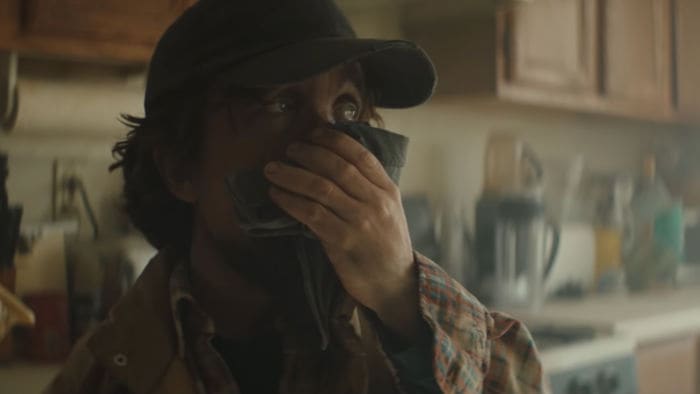
I Think We’re Alone Now
Del, played by Peter Dinklage, is the star of I Think We’re Alone now, a movie about a lonely person navigating the world after the human race has been wiped out completely. He spends his days in a small, empty town, content in his solace and the utopia he’s carved out for himself.
Of course, there would be no compelling movie if we’re just going to watch him enjoy his alone time (auteurs would disagree). So comes Grace, played by Elle Fanning, ann interloper whose motives and background we’re not so clear on. What do you do when it’s the end of the world and someone still manages to annoy the heck out of you?
That phrasing makes this film sound like a comedy, but it’s not, really. Dinklage and Fanning are great at playing people who face the end of the world. We’re not going to share much lest we spoil important parts of the story, but we’re going out on a limb to say that this is a pretty simple story with a bonkers plot twist. We’re divided on the subject of out-of-left-field plot twists. But perhaps it’s common wisdom that a great plot twist should serve the narrative, not derail it. This is kind of does both. Hate it or love it, it’s bound to be something memorable purely for that twist near the end.
Director: Reed Morano – Screenplay: Mike Makowsky – Cast: Peter Dinklage, Elle Fanning, Charlotte Gainsbourg – Run Time: 1h 33m
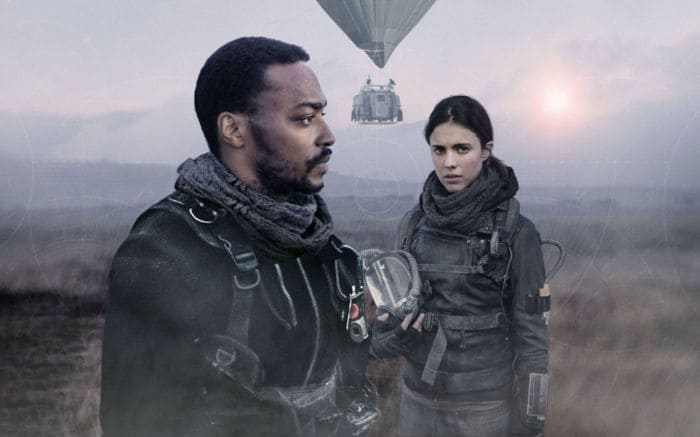
IO
Set in a post-cataclysmic Earth, Sam, played by Margaret Qualley, is one of the last remaining survivors of this world. She’s a young scientist dedicated to finding new methods for humans to adapt and survive instead of abandoning their home completely.
Everything changes when Micah, played by Anthony Mackie, another survivor, arrives. With final shuttle scheduled to leave Earth en route to a distant colony, Sam must decide whether to take the journey to safety or stay on Earth. As typical of most sci-fi films, IO is riddled with scientific inaccuracies. Unlike those, however, the sheer amount of them amazingly doesn’t take a toll on the potential of enjoying this simple heartfelt portrait of loving Earth despite the impossible odds.
If you’re a teenager and love dystopian tales, you’re going to find plenty of elements here that are delightful and significant without being too pandering. Critics didn’t really take this well, as it’s currently sitting at Rotten Tomatoes with a 29% rating. But trust us when we say that something (plenty of things, actually) work well here, even if they’re not as coherently tied by the time the credits roll as they could be.
Sometimes IO feels more interested in flashy displays of human resilience than the actual people that trigger it. That’s a minor flaw, though, and doesn’t take away from the potency of ideas presented here.
Director: Jonathan Helpert – Screenplay: Clay Jeter, Charles Spano, Will Basanta – Cast: Margaret Qualley, Anthony Mackie, Danny Huston – Run Time: 1h 36m
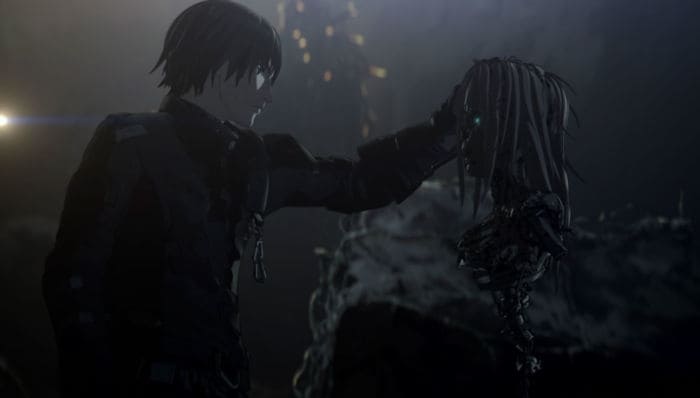
Blame!
The only Japanese film in this list (there are a lot of great choices; sadly they’re not available on Netflix as of this writing), Blame! is an excellent CGI animated sci-fi film set in the distant technological future where civilization has reached its ultimate Net-based form. A previous “infection” has caused automated systems to malfunction, causing a multi-leveled structure that replicates itself infinitely in all directions.
Humanity shortly loses access to the city’s controls, and comes to be hunted down and purged by the defense system known as the Safeguard.
We’re inclined to share more, but we’re going to do you a disservice by explaining the plot further. The good thing is you’re in for a treat if you jump headfirst and watch Blame! with as little knowledge as possible beforehand. The film is not only on its own a striking meditation on the merits and demerits of super advanced technology, it’s also a masterful and faithful adaptation of the iconic manga.
Filled with multi-dimensional characters, a plot that isn’t rushed, and concepts that the film gives time to fully simmer, Blame! is an example of a post-apocalyptic film done right — that is, given enough breathing room to really hash out its ideas instead of suffocating them with unnecessary tropes. We’re going to end this with a hot take: the Japanese really know how to make cinema.
Director: Hiroyuki Seshita – Screenplay: Sadayuki Murai, Tsutomu Nihei – Cast: Takahiro Sakurai, Kana Hanazawa, Sora Amamiya – Run Time: 1h 46m
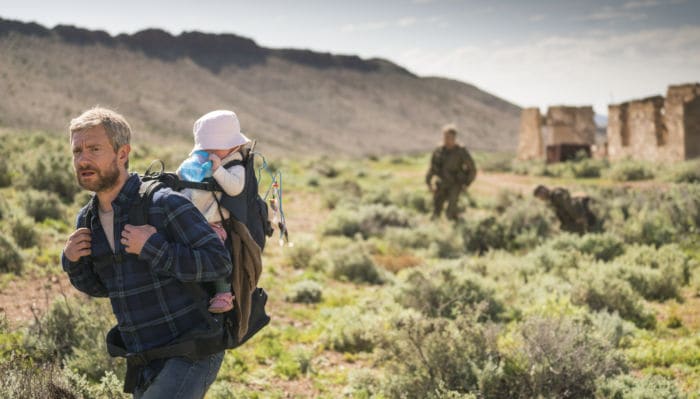
Cargo
One of Netflix’s more accomplished original films, Cargo is set in rural Australia in the aftermath of a hostile pandemic. A father, who’s infected, is desperate to find a new home for his infant child. And not just a home, too — he must find a means to protect her from himself.
Cargo is supplied with powerful performances from a star-studded cast. But what really separates Cargo from the films already mentioned is that it really cares about people and humanity. It doesn’t exchange them for cathartic storytelling or exploits them for dramatized, haphazard explorations of trauma. Instead, it’s passionate, sincere, and very forthcoming. And this kind of fortitude is what’s lacking in most post-apocalyptic films in recent years.
Children of Men, released in 2006, is a fine example of a dystopian film that cares about its characters more than it cares to present the horrors of the new world in which it’s set. Cargo is a far cry from the cinematic brilliance of Children of Men, but it’s not difficult to think that they swim in the same gene pool. As such, Cargo transcends its underpinnings — hackneyed genre tropes are replaced in favor of a more delicate, fragile tale of human connection and family. Oh, and bonus: It’s also probably one of the finest, most thematically accomplished zombie movies ever made. George A. Romero himself would be so, so proud.
Director: Ben Howling, Yolanda Ramke – Screenplay: Yolanda Ramke – Cast: Simone Landers, Martin Freeman, Marlee Jane McPherson-Dobbins – Run Time: 1h 45m

